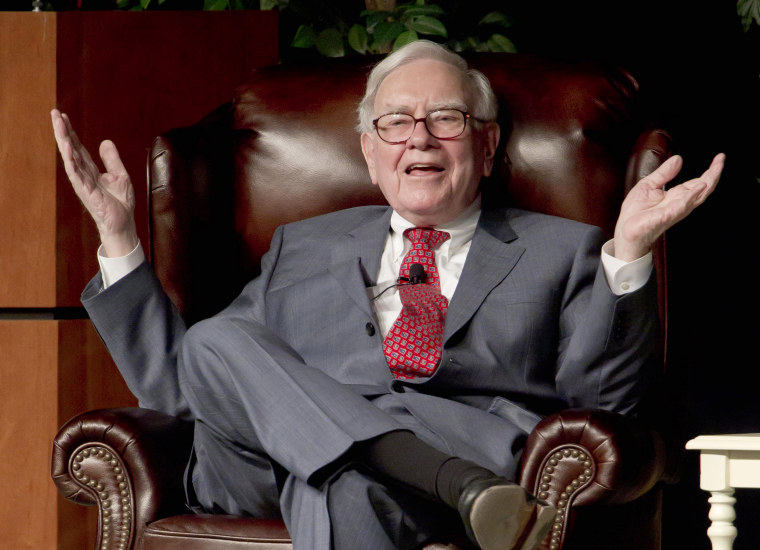The “Oracle of Omaha” confirmed opponents’ worst fears about the Republicans’ new health care plan: It’s a giant giveaway to the rich.
Berkshire Hathaway Chairman Warren Buffett characterized the GOP plan to replace former President Barack Obama’s Affordable Care Act as “a huge tax cut for guys like me” at the company’s annual meeting on Saturday.
Buffett elaborated in a CNBC “Squawk Box” interview Monday morning, saying he would pay 17 percent — about $680,000 — less in taxes if the “repeal and replace” bill that passed the House last week was implemented in its current form.
"If there's one clear-cut message that comes out of that bill it is we're going to cut the hell out of income taxes for the rich on investment income,” he said.
Windfall for Billionaires Like Buffett — and Trump
The GOP’s American Health Care Act rolls back a number of taxes implemented by the Affordable Care Act, but the one most pertinent to Buffett — and other ultra-wealthy Americans — is the repeal of a 3.8 percent surtax on capital gains and other investment income for high-income taxpayers. The repeal of the surtax would be immediate, as opposed to being phased out in the coming years.
“That’s the biggest windfall,” said Steve Ellis, vice president at Taxpayers for Common Sense.
The Congressional Budget Office has not yet released a report on the budgetary impact of the version of the bill the House voted on last week, but its calculations back in March on the original bill found that rolling back the surtax alone would cost nearly $158 billion by giving that money back to primarily the wealthiest taxpayers.
“Warren Buffett’s right. For somebody like him this would be a major tax cut,” said Howard Gleckman, a senior fellow at the Urban-Brookings Tax Policy Center. “If you just look at the tax provisions of the American Health Care Act, which repealed the tax increases in the Affordable Care Act, it dramatically is skewed towards the highest income households.”
People who earn $4 million or more a year would get an average tax cut of $207,000. Those at the bottom would see their taxes actually tick up by $10.
Including the 3.8 percent surtax and other tax provisions — like a 0.9 percent increase in the Medicare tax on high earners — Gleckman said households in the top 2 percent of the income spectrum would reap a whopping 80 percent of the benefits of the tax cuts in the GOP’s plan. The top 0.1 percent of taxpayers, those who earn roughly $4 million or more a year, would get an average tax cut of $207,000. Those in the bottom income quintile, meanwhile, would see their taxes actually tick up by $10.
Why the Rich Will Get Richer
Lowering taxes on investment income benefits the richest taxpayers because most Americans earn their money via wages, not investments. To the extent that we do invest and live off the returns, those funds are mainly in tax-preferred vehicles like 401(k)s or IRAs.
“The wealthier you are, the more this impacts you, because the way your asset blend is, you generally have a greater percentage of your wealth coming from investments than wages,” said David Herzig, a law professor at Valparaiso University.
Some experts suggested that House Republicans’ decision to repeal the tax was driven more by tax ideology than healthcare policy.
“I think the claim on the other side was one that was always pretty critical of this tax,” said Michael Knoll, a professor at the University of Pennsylvania Law School. “This 3.8 percent tax looks much more like an element of redistribution, and that, in the view of some, is not what these kinds of plans are meant to be.”
Gleckman said the progressive nature of the Affordable Care Act’s tax provisions was deliberate, in order to fund provisions like the expansion of Medicaid and subsidies so lower-income Americans could afford to get health insurance.
“What President Obama did explicitly with the Affordable Care Act is he partially paid for the act subsidies by raising taxes on high income,” he said.
The Urban Institute estimated that 19.2 million previously uninsured Americans got health insurance under the Affordable Care Act. Rolling that back, on the other hand, would benefit a much smaller number of the richest people.
“You eliminate almost a 4 percent tax on not just capital gains, but all your investment income,” Herzig said. “That’s a huge savings for wealthy people.”
